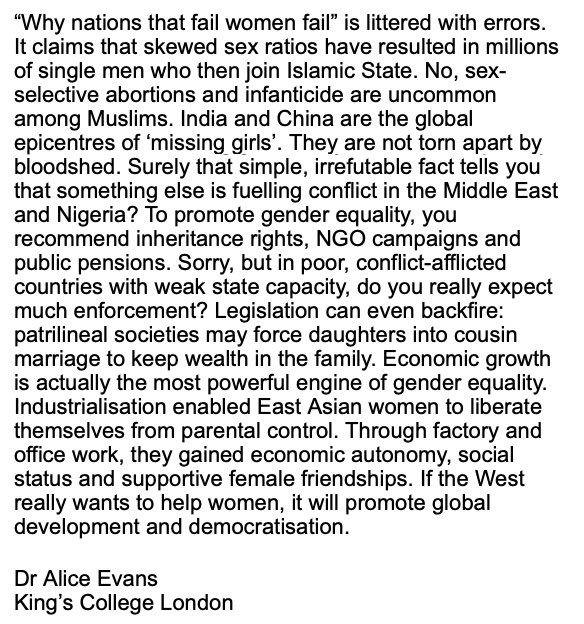Who wrote this article for the Economist on gender?? Outside the West, the world largely comprises patrilocal clans like the Middle East?? Are you serious?? economist.com/leaders/2021/0…
God. Latin America is largely bilateral, pre-conquest societies mostly recognised gender complementarity. The Caribbean is famously matrifocal! 15% of societies are matrilineal! Including poor authoritarian places! Russia was patrilineal, but most families are now nuclear!
The Economist also claims skewed sex ratios have resulted in millions of single men, who then join Islamic State. Um. Muslims actually have great sex ratios!!! They seldom kill daughters. Nigeria’s SRB has worsened, but it’s not huge, or the main driver of conflict.
They don’t link to the study, but isn’t this largely a description of the Middle East? (which also has strong kinship intensity & powerful religious authorities that resist legal reform).
Now for the Economist’s policy recommendations… LEGAL REFORMS! GENDER SENSITISATION! AND PUBLIC PENSIONS! Sorry… what is the evidence base for these claims? Which conflict-afflicted country has reformed its gender laws & public pensions, then become more peaceful??
They should read @PeaceMedie’s excellent book on police responses to rape and intimate partner violence in post-conflict Liberia & Côte d’Ivoire! Like many Africa countries, there is strong legislation, but given weak state penetration it’s basely enforced.
Now this paragraph champions girls’ education, donors & NGO campaigns Actually, the most feminist foreign policy is one that promotes global development. GROWTH is the biggest engine of gender equality. The greatest trigger of conflict & early marriage is climate breakdown.
I’m not denying that gender issues exacerbate conflict or the importance of girls’ education But this piece is misleading & littered with errors It neglects larger causes of conflict in MENA & Nigeria, wildly over-states NGO interventions & legislation, & disregards development
Also, I’m not sure we know that patrilineal kinship or even clans emerged for “self-defence”?? Actually a strong predictor of patrilineal inheritance is the plough, And MENA’s strong kinship intensity likely developed relatively recently, under the Umayyad Caliphate.
I wish the author would just look at the two biggest countries in the world: India & China. They are certainly patriarchal; they are not torn apart by bloodshed. Surely that simple and irrefutable fact tells you something else might be going on in the Middle East & Nigeria?
China used to be patrilineal, but today the largest proportion of households are nuclear. …alofchinesesociology.springeropen.com/articles/10.11… Hu & Peng. Kinship has waned with economic growth.
Nuclear families are increasingly common in many parts of world (including Russia & China), as they transition out of agriculture. I couldn’t name all the different kinds of family formations in one tweet, but you can see the map above. There is heterogeneity, eg bilateral.
Here’s a map of patrilocality, you can read about their data here: globaldatalab.org/areadata/data/
For comparison, check out this excellent in-depth analysis of conflict & kidnappings in Nigeria ft.com/content/d8d9bf…
This paper on drought & conflict is excellent
This paper on drought & conflict is excellent
I’ve written a letter, correcting @TheEconomist. What do you think?
If you’re sceptical about the importance of growth for gender equality, check out my blog explaining how East Asia overtook South Asia draliceevans.com/post/how-did-e…
Feminist activism is crucial for women’s political representation & protection against GBV (as shown by @malahtun & @SLaurelWeldon). To keep it brief & draw attention to global economic cooperation, I stressed development. But do see my & other people’s work on activism!!
Here’s how I think @TheEconomist went wrong, They mention a study finding a correlation between gender inequalities & conflict. I suspect the causal mechanism is not actually female oppression, but cousin marriage Then, to maintain tight kinship intensity, women are secluded
In societies where cousin marriage is idealised to maintain power & wealth, women must be closely guarded to ensure endogamy. Then, once women are secluded & surveilled, they have few rights. But the causal mechanism here would likely be very strong kinship intensity.
That’s why I mention India. Families tend to prefer sons, revere them as providers, & restrict women’s mobility in order to maintain jati-endogamy. Female employment is not so different from much of the Middle East. The BIG difference is cousin marriage.
How do we know that the causal mechanism is cousin marriage? Check out @DumanBRad’s new paper in the Journal of Development Economics sciencedirect.com/science/articl…
Why do a third of families in the Middle East & North Africa practise cousin marriage? In this classic paper, Korotayev argues that conquered people under the Umayyad Caliphate married their cousins as a form of Arabisation, to gain upward mobility. jstor.org/stable/3774053
If only we could study the impact of the conquests on gender relations, tracing what societies were like before & after OH WAIT! We can! Because there are MANY books on this! And they suggest that after several generations, veiling & seclusion became more common in towns.
So the historical and contemporary evidence suggests that female seclusion is a *consequence* of conquests, female property rights, & cousin marriage. Cousin marriage is the real driver.
I have not seen studies that examine the relationship between cousin marriage on conflict, but that would be worthy of investigation (imo).
The article also mentions Nigeria. There are many causes of conflict, which I mentioned in the thread: drought, inequality. I don't know how important this is, but the Fulani (a language I used to speak a little, fyi) practise cousin marriage jstor.org/stable/41466834
Societies with strong kinship do permit female education: MENA now has gender parity in enrolment. But female employment remains low. The economic returns do not compensate for the loss of honour. So @TheEconomist over-states the extent to which education will liberate women
I call this the “patrilineal trap”: Few families want to let their daughters work outside, because she might be perceived as promiscuous. And this would stain the honour of all her kinsmen, since close-knit clans share honour collectively. This motivates intense surveillance
But this is not insurmountable! Cousin marriage rates are highest in the Gulf. But rapid economic growth & labour indigenisation laws have meant that employers in Qatar & Kuwait have desperately needed & recruited women! Cue skyrocketing female employment!
Contrary to @TheEconomist’s emphasis on NGO campaigns, donors, legal reforms, it was growth & labour indigenisation laws that enabled Kuwaiti women to come out of their homes Now feminists are organising to overturn the patriarchy. See my blog: draliceevans.com/post/is-xenoph…
If you accept @TheEconomist’s argument then looked at 1970s Taiwan & South Korea, you’d predict TOTAL ECONOMIC FAILURE! - Girls had little economic autonomy; fathers signed factory contracts - HUGE gender pay gaps! - Son preference! - Sex discrimination in law! - VAW! And yet…
Oh dear, look at this patrilineal country that closely policed female kin, with huge sex discrimination in practice & in law. It must be doomed to be poor forever…. Paging economists, what was South Korea’s growth like?































